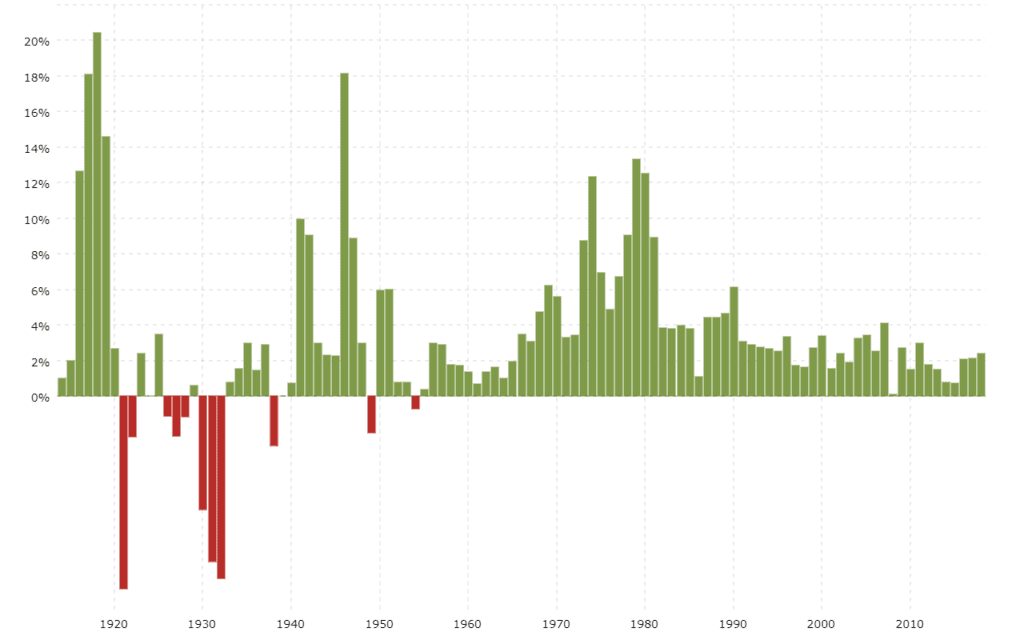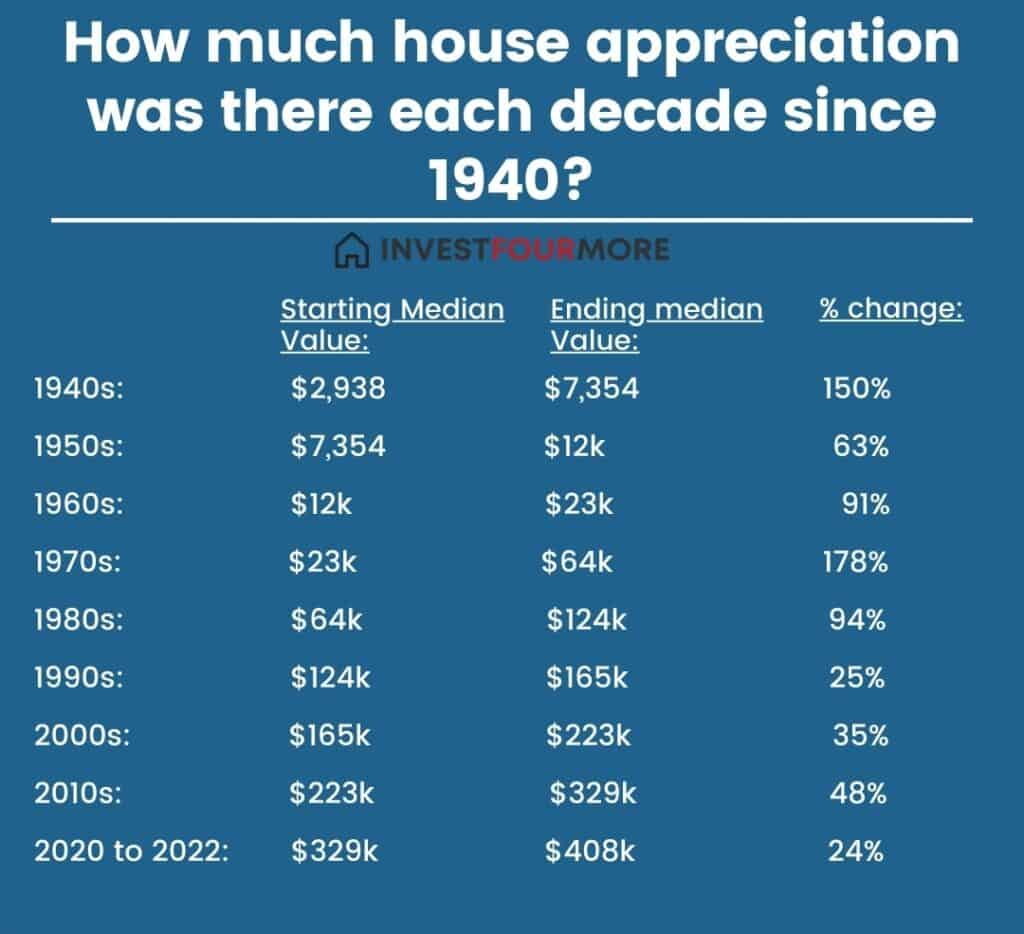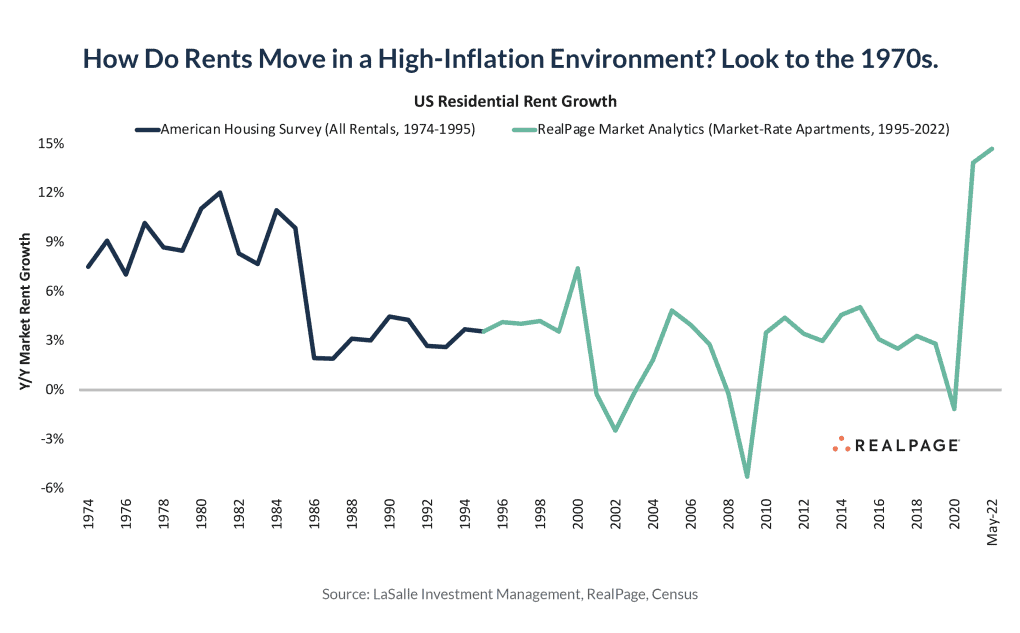For many years inflation was steady and not a big concern in the US. However, that has changed in the last year and high inflation is now a worry for many people. High inflation raises the costs of most goods and can make it tougher for many to make ends meet. High inflation can also create opportunities to make more money. Some businesses and investments do very well in a high inflation environment. Surprisingly, real estate is one of those investments that does well historically despite what you might hear about a “crash” coming.
Why do so many people think real estate prices drop during high inflation?
I keep hearing about how real estate drops or will crash when interest rates increase. Interest rates usually go up when there is high inflation. We have definitely seen interest rates rise and the real estate market cool down, but there has been no crash. The reason people say real estate drops with high-interest rates is that people can afford less house with higher rates.
With a 3% interest rate on a $330k loan, the payment would be $1,391 for principal and interest. If the rate raises to 6%, the payment would increase to $1,979 a month. With 9% interest rates, the payment would be $2,655 a month.
It is obvious that payments go up when rates go up. If rates go up real estate has to go down because demand drops! At least, that is one theory. What does history say about inflation and real estate?
What were the highest appreciating decades in the last 100 years?
Real estate has its ups and downs but over time, it has always gone up. In the last 100 years, there have been 2 real estate crashes as defined by a 20% drop or more. The 2008 housing crisis and the great depression were the only times there has been a 20% or higher reduction in median sales prices across the nation. There were also crashes in the 1870s and 1840s for a total of 4 crashes in the history of the United States.
If we assumed high inflation causes crashes we might assume both of these time periods had high inflation. However, neither of those two eras had high inflation, In fact, the opposite occurred. Both of those time periods saw very low inflation or even deflation.

The two decades with the highest inflation were the 1940s and the 1970s. The 1970s and the 1940s also saw the highest real estate appreciation in the last 100 years.

Why don’t higher interest rates make real estate prices go down?
Many make the assumption when payments go up, houses become cheaper because people can afford less. However, this theory assumes people are trying to buy the most expensive house they can and if rates go up they can’t pay more. However, many people are able to pay more, even if they don’t want to because they have to. The United States has one of the most affordable housing markets in the world. Even, when rates increase, houses are still much cheaper compared to income, than most counties. The US is the fifth most affordable country in the world right now even with higher interest rates.
There are also many different loan types that allow people to have a smaller loan payment even when interest rates are high. An adjustable rate mortgage has a lower payment than a 30-year fixed rate loan.
The biggest reason prices don’t usually decrease is because of supply and demand. Yes, demand goes down when interest rates go up, but so does supply. When interest rates increase building slows down and many sellers decide not to move and hold on to their homes. Building starts have decreased significantly in the US as have new listings. While new builds and listings decrease the cost to build increases. There could be a massive decrease in sales volume, but there has never been a massive decrease in prices associated with high inflation. Prices usually only crash if there is an oversupply of something. If supply drops along with demand, there may not be an oversupply.
What happens with rents during high inflation?
Rents are not impacted by interest rates directly because consumers do not need to get a loan to rent a property. However, rents are impacted by interest rates because the investor buying property, usually gets a loan and if rates are higher, their costs are higher, and they will need to charge more rent to make it worthwhile to buy a rental. If investors stop buying rentals, supply will shrink and prices will increase (supply and demand). As with most costs, rents increase during high inflation time periods as well.

Rents have gone up significantly in the last 2 years thanks to a shortage of rentals. Despite what you hear in the media, there are fewer rentals now than 6 years ago, while there are 10 million more owner-occupants. The same thing happened in the 1970s with high inflation. When inflation was lower, rents did not increase nearly as much.
If you are buying real estate now, and inflation keeps increasing, there is a good chance rent rates will keep increasing at high paces as well.
Debt and real estate during inflation
Debt can be an amazing tool if used right. It can also be a horrible crippling tool if use wrong. During high inflation, debt can be used to massively increase your returns. Inflation makes money worth less in the future. I have an inflation calculator that shows you exactly how much less. If I take out a loan to buy a rental property I can leverage my money to buy more properties with less cash. If the properties go up in value or rents go up, my investment increases significantly more than if I had used all cash. For example:
- I buy a $100k house for all cash and it makes $600 a month after all expenses and that house goes up in value to $110k after a year. I make 7.2% on monthly income ($600 x 12 months = $7,200 a year $100,000 = 7.2%). I would make a 10% return on my investment in equity as well.
- I buy a $100k house with 20% down and it makes $200 a month after all expenses (including the mortgage) and that house goes up in value to $110k after a year. I make 10% on the monthly income ($200 x 12 = $2,400 / $25,000 = 9.6%). I added in closing costs for the loan to get to $25,000. I would make a 40 percent return on my investment in equity as well.
Now there would be some selling costs associated with the properties if you sold and prices are probably higher than $100,000 but I wanted to use simple numbers. Over time the values would keep going up as would the rents. Because you are using leverage you can buy 3 houses for every one you could buy with cash and if values go up 10% a year and rents 9% a year, you actually see a much higher return because you are using leverage. The higher inflation is, the less your debt is worth, and the higher your asset and rent go (in theory).
Conclusion
I do not know for sure what will happen with real estate. We have seen the market slow down and it could slow down even more. In the past, we saw prices drop slightly after big interest rate increases before they went up again. Trying to predict short-term markets is very tough and there is no guarantee last time will be like this time. In my opinion, there is a very good chance rent will keep increasing and house prices will go up in the long run. As with any market, it is smart to have plenty of reserves (cash) and cash flow on any rentals you buy.

